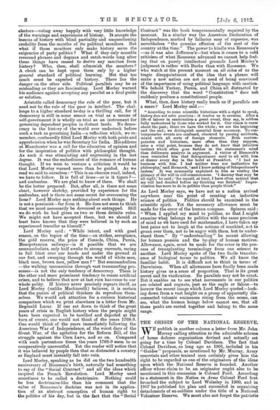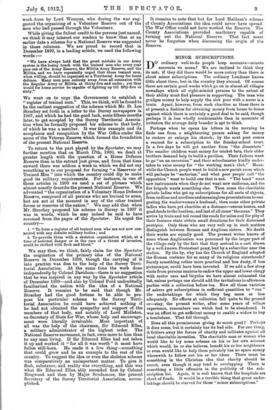'1'.11/1 ORIGIN OF THE NATIONAL RESERVE.
lATE publish in another column a letter from Mr. John Murray calling attention to the admirable scheme of home defence organization devised and actually set going for a time by Colonel Davidson. The fact that Colonel Davidson, so long ago as 1901, included in his " Guides " proposals, as mentioned by Mr. Murray, Army reservists and other trained men certainly gives him the right to be regarded as one of the originators of the ideas upon which the National Reserve is founded. Another officer whose claim to be an originator ought also to be mentioned in this connexion is Colonel Ford. According to a statement in the Nation in Arms Colonel Ford first broached the subject to Lord Wolseley in 1900, and in 1907 he published his plan and succeeded in organizing detachments of ex-soldiers under the title of a National Volunteer Reserve. We must also not forget the patriotic) work done by Lord Wemyss, who during the war sug- gested the organizing of a Volunteer Reserve out of the men who had passed through the Volunteers.
While giving the fullest credit to the persons just named. we think it may interest our readers to know that at an earlier date a scheme for a National Reserve was suggested in these columns. We are proud to record that in December 1899, in a leading article, we used the following words :—
"We have always held that the great mistake in our Army system is the losing touch with the trained men who every year pass out of the Army Reserve, the Militia Army Reserve, and the Militia, and we have repeatedly urged that these trained men, when willing, should be organized as a Territorial Army for home defence. Many men pass entirely away from all connexion with the Regular Army or Militia at thirty-five and under ; yet they would for home service be capable of fighting up till fifty-five or sixty."
We went on to urge the Government to establish a " register of trained men." This, we think, will be found to be the earliest suggestion of the scheme which Mr. St. Loe Strachey set forth in a letter to the Surrey newspapers in 1907, and which he had the good luck, some fifteen months later, to get accepted by the Surrey Territorial Associa- tion when he formally proposed his scheme to that body, of which he was a member. It was this example and its acceptance and recognition by the War Office under the name of the Veteran Reserve which formed the foundation of the present National Reserve.
To return to the part played by the Spectator, we may further mention that on March 17th, 1900, we dealt at greater length with the question of a Home Defence Reserve than in the extract just given, and from that time onward there was seldom a week in which we did not say something as to our proposal for forming " a Reservoir of Trained Men " into which the country could dip to make good its military requirements. For instance, in one of these articles in 1900 we used a set of phrases which almost exactly describe the present National Reserve. We advocated " the organization of a Voluntary Home Defence Reserve, composed of all persons who are trained to arms, but are not at the moment in any of the other trained forces or reserves of the nation." We may add that when Mr. Strachey proposed his scheme in Surrey in 1907 it was in words, which he may indeed be said to have resumed from the pages of the Spectator. He urged the country-
1. " To form a register of all trained men who are not now con- nected with any definite military bodies ; and
2. To provide them with a skeleton organization which, at a time of national danger or in the case of a threat of invasion, could be clothed with flesh and blood."
We may then, we think, fairly claim for the Spectator the origination of the primary idea of the National Reserve in December 1899, though the carrying of it into practice was due to the help of the Surrey Terri- torial Association. At the same time the work done independently by Colonel Davidson—there is no suggestion that he was inspired in any way by the Spectator article of December 1899—and also by Colonel Ford undoubtedly familiarized the nation with the idea of a National Reserve. It remains to be said that though Mr. Strachey had the good fortune to be able to pro- pose his particular scheme to the Surrey Terri- torial Association he could have achieved nothing if he had not obtained the sympathy and support of the members of that body, and notably of Lord Midleton, ex-Secretary of State for War, whose help and encourage- ment were literally invaluable. Most important of all was the help of the chairman, Sir Edmond Elles, a military administrator of the highest order. The National Reserve movement, in fact, owes more to him than to any man living. If Sir Edmond Elles had not taken it up and worked it " for all it was worth " it must have fallen still-born. He made it a live thing—something that could grow and be an example to the rest of the country. To suggest the idea or even. the skeleton scheme was comparatively an unimportant matter. To give it flesh, substance, and reality was everything, and this was what Sir Edmond Elles, ably seconded first by Colonel Ringwood and then by Major Scudamore, the present Secretary of the Surrey Territorial Association, accom- plished. It remains to note that but for Lord Haldane's scheme of County Associations the idea could never have spread. The War Office could not have worked the Reserve. Tim County Associations provided machinery capable of turning out the National Reserve. That fact must never be forgotten when discussing the origin of the Reserve.



















































 Previous page
Previous page